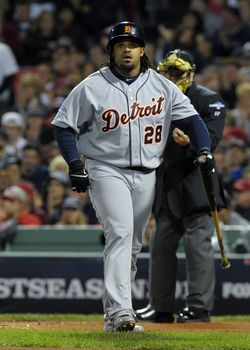The Rangers and Tigers shook up their lineups and payrolls Wednesday night, as the Tigers sent slugger Prince Fielder and $30MM to Texas for second baseman Ian Kinsler. Here's my take from each team's point of view.
Kinsler, 32 in June, slipped offensively to .266/.334/.418 over the last two seasons. Is he still above average defensively at second base? A stat like UZR says no, while The Fielding Bible's defensive runs saved says yes. In fact, The Fielding Bible's panel of ten experts considers Kinsler the sixth-best defensive second baseman in the game, with half of the panel ranking him fourth or better. Out of the five players who topped Kinsler defensively, he outhit all except Dustin Pedroia and Ben Zobrist in 2013. Kinsler might not be the player he was in his mid-20s, which is normal, but he's still close to a top ten second baseman.
Kinsler also has four years and $62MM remaining on his contract, and in a sabermetric sense, he has a decent chance of returning that much value. Wins above replacement puts a large premium on playing a position like second base decently, as it should, but I don't think the market of 29 other MLB teams viewed Kinsler as a $15.5MM player for each of the next four years. When the market undervalues your asset, the best move is to keep it, but the Rangers have Jurickson Profar. 21 in February, Profar is MLB-ready and highly regarded around the game, and the Rangers intend to slot him in as their regular second baseman. The upside is huge, but there's no guarantee he'll be as good as Kinsler over the next couple of years. He will, however, play at the league minimum.
In Kinsler, the Tigers get a second baseman to replace Omar Infante, who is currently a free agent. GM Dave Dombrowski indicated last night that Infante was as good as gone regardless of this trade, which is surprising. Even a three-year, $30MM contract for Infante would have been acceptable value, and the Tigers had that option available to them. It seems likely the Tigers' motivation in last night's trade was more about getting out from Fielder's contract than acquiring Kinsler. Fielder is signed through 2020, and with a seven-year, $168MM commitment, the fact that the Tigers had to send $30MM to the Rangers to trade him for a neutral-value asset suggests Fielder had significantly negative trade value.
If the deal was mostly about payroll flexibility, did the Tigers have better options to achieve it? Could they have signed Infante for $30MM and included $42MM to send Fielder packing for a different, cheaper player such as a quality late-inning reliever? Such a move could have afforded the Tigers over $90MM in new payroll flexibility, rather than the $76MM they added. They still would have seen the benefit of moving Miguel Cabrera across the diamond. However, trading Fielder for a reliever or something similar would have been a tough sell to fans, and even at Jayson Werth money for Fielder it's not as if the Tigers would have found a dozen suitors.
Fielder will play next year at age 30, and had a seven-year, $168MM commitment remaining. With a disappointing platform year and a draft pick cost attached, could agent Scott Boras have gotten him that contract this offseason? Add in the fact that Fielder seems much closer to a permanent DH role than he did two years ago, and I think Boras would have fallen short. It's more plausible that Fielder could have gotten $138MM over seven years, though, and the Rangers didn't have to give up a draft pick. Plus, even if they overvalue power, the free agent and trade markets didn't offer a first baseman like Fielder this offseason. Fielder's off-year was about as good as Mike Napoli's 2013 season, which might be Napoli's peak. Fielder was an elite hitter as recently as 2012, and the Rangers expect him to bounce back closer to that level in 2014.
Fielder serves as a big offensive upgrade for the Rangers at first base, though it's likely they lose offense at second base if they go with Profar. They've still got flexibility at an outfielder corner, catcher, and designated hitter to add more offense. I wonder if Brian McCann becomes less viable for them, as the oft-cited general plan to move McCann to DH around the fourth year of his contract may be hampered by the Rangers' need to put Fielder there.
I'm sure Boras will have plenty to say about this deal. He probably would suggest the Rangers righted a wrong in acquiring Fielder, since they were not able to finish a free agent deal with him two years ago (perhaps due to objections from Nolan Ryan). While the move creates more opportunity for the Tigers to do a historic pitching contract with another Boras client, Max Scherzer, I think that matters to the agent only in that he can count the Tigers as a more viable suitor once Scherzer reaches free agency after the 2014 season.
